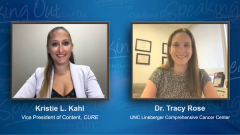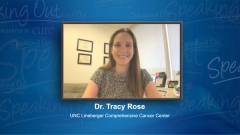
Expert Discusses Effects of a Bladder Cancer Diagnosis on Caregivers and the Support Available to Them
As part of its “Speaking Out” video series, CURE spoke with Dr. Tracy L. Rose, on behalf of the Bladder Cancer Advocacy Network, about the role of the caregiver in bladder cancer and how they can also seek support to aid them.
Kristie L. Kahl: how does a cancer diagnosis affect a loved one and the role that they now need to take on as a caregiver?
Tracy L. Rose: So there's really no doubt that I think receiving a diagnosis of cancer is life altering for nearly everybody. And I think it's especially challenging for caregivers because these are people that are not experiencing the cancer or the symptoms for themselves directly, but are really there for all the ins and outs of it. And sometimes they feel a little bit helpless. And I think it can be a new dynamic between people that hasn't always been there. And so people are sort of learning that they have cancer and diving right into the treatment plan, and (caregivers are a part of) all the coordination and sometimes feeling bad, physically, all that that entails. But they're also sort of navigating a relationship of caregiver and patient that they've not necessarily had before. And so that can be a challenge. It can also be incredibly fulfilling for a lot of people. But it is no doubt different. And I think sometimes it can be actually harder on the caregiver than the patient themselves, I think, because they feel like it's their job to sort of help navigate things and keep (the patient) feeling well, and that can all be incredibly challenging.
Kahl: What role does a caregiver play when it comes to advocating for their loved one, especially when it comes to treatment decisions?
Rose: There's no doubt that patients with caregivers who are their (support system) have better outcomes than patients that don't. It's incredibly important for the caregiver to also have the ability to say when they think things are wrong, and they can be a really great source of information. Sometimes the patient can't remember quite when the symptoms happened or what it was like. And so having someone sitting next to them with a notebook, writing down things, while the patients are just processing can be so valuable in the relationship. And also, seeing things through a different lens. It's very common that a husband or wife of one of my patients will say to me, “A few months ago, they were just out of bed earlier in the morning, and they weren't napping as much,” and things that sometimes the patient can’t always remember or realize that they're doing, their caregivers can notice. And so, you know, just having someone there to really speak up, and I think encouraging both parties to have their turn and sort of saying what's bothering them is really important.
Kahl: Why is it also important for caregivers to make sure that they're taking care of themselves, that they're also getting support?
Rose: We are lucky, at least at our cancer center, that we've recognized how important it is to give caregiver support, because you can imagine these people are really the primary support for the patient. In order to fully support the patient, you have to support the caregiver to. And like I said, it can be a common feeling of both helplessness and not being sure exactly how to best support the patient. And so that is really a time that we can intervene and sort of help people through this.
It can be so challenging to be a caregiver and feeling like you just either wish that you could take some of the burden off of the patient, but don't quite know how. And so we routinely offer counseling and cancer support services for both the patients and the caregivers. That comprehensive care is so important for people. You can't take care of someone else if you're not taking care of yourself adequately. We speak about this not necessarily only in cancer or medicine, but kind of across the life spectrum. And I think it just becomes that much more important now. As the intensity of a medical issue or diagnosis or treatment goes up, and this is a high-risk time for both patients and caregivers in terms of mental health issues. I think caregivers are not immune to the depression and the anxiety and things that can really come to a head at the time of a cancer diagnosis. And so, making sure that the general support is there, but also the extra layer of mental health support, if it's somebody that needs it, is so important.
Kahl: In the bladder cancer space, do you have any kind of resources or support groups that you could recommend for our caregiver audience?
Rose: The obvious answer that comes to mind is BCANs, the Bladder Cancer Advocacy Network. I always hesitate to recommend any sort of social media to my patients in terms of medical information. But BCAN does a really good job, not only giving good validated medical information, but also connecting patients and caregivers in a social way to really learn about experiences. They also have local chapters. So for example, BCAN has a Triangle Chapter where they meet, I think it's once a month and people get together and ask questions. And it's really great, not only for patients, but commonly for caregivers to meet people who have been through that experience.
Most cancer centers will have something similar, both (for patients undergoing) active cancer treatment and also survivorship programs, not only for patients, but also for caregivers. It's important to ask your provider or your oncologist or surgeon, is there a cancer support program? What does that look like? And most places will have really vast mental health support, sometimes alternative medicine support, financial support, social work, etc. And so I think that those are all resources that typically are available both to patients and to caregivers, and even bereavement support, which unfortunately, we sometimes have to talk to. But, you know, being a caregiver doesn't end if a patient passes away, and so that's always available at a lot of cancer centers too.
Transcription edited for clarity and conciseness.








